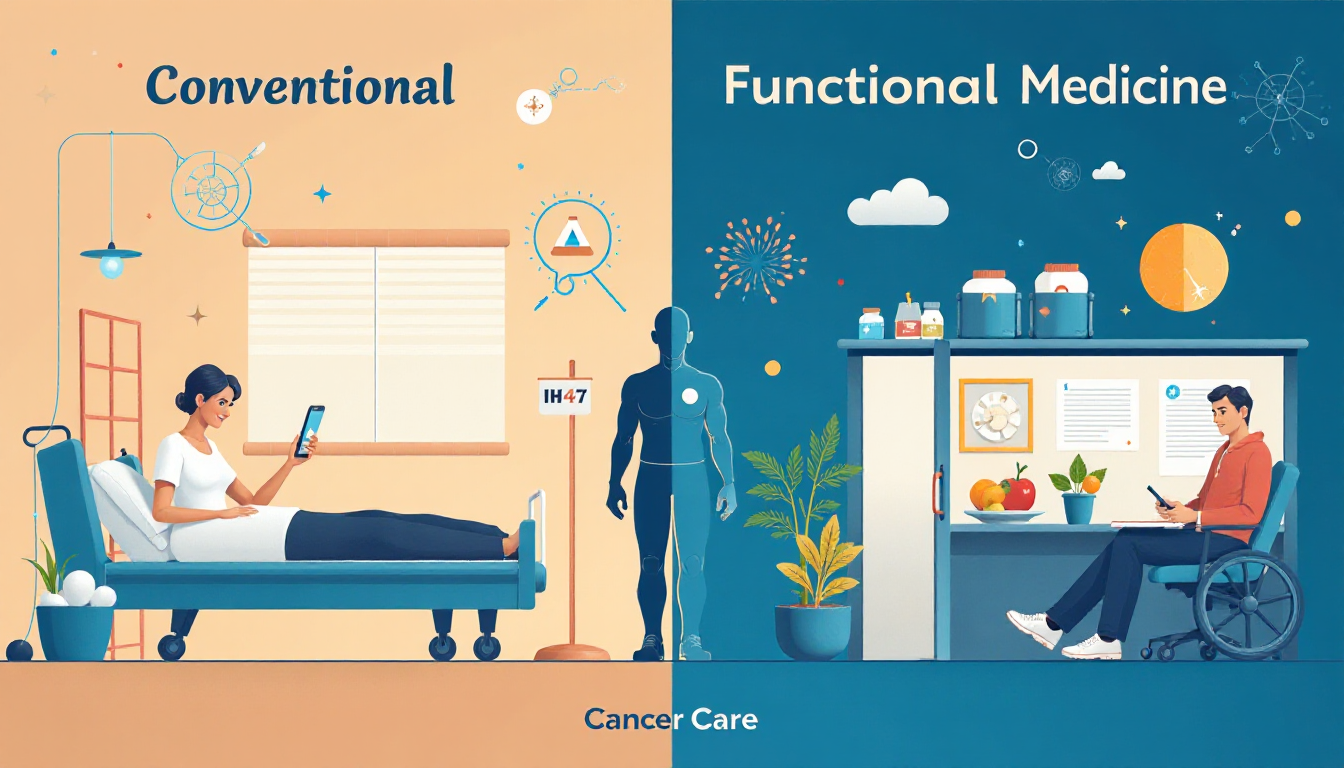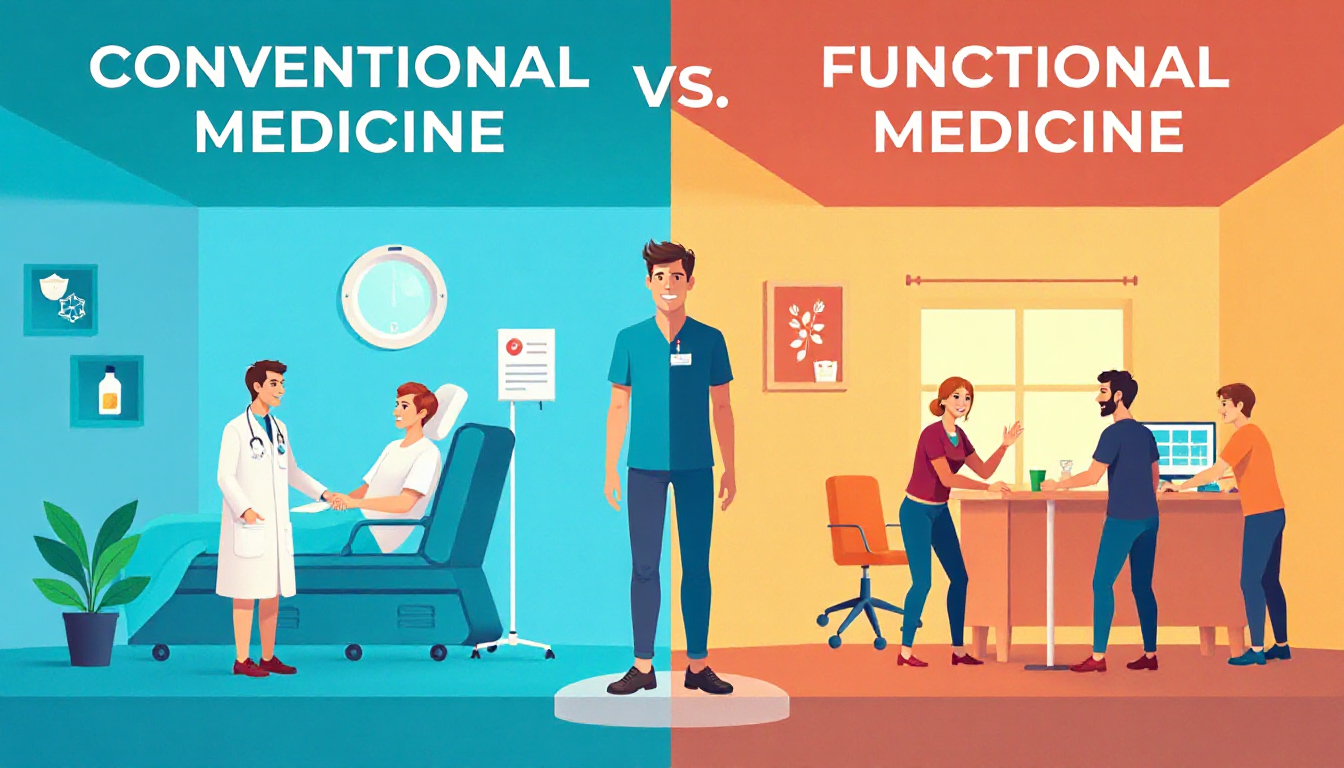When I first encountered the world of cancer care, I was taken aback by the stark contrast between conventional and functional medicine. It was like stepping into two different realms: one grounded in rigorous scientific protocols and the other woven with holistic principles that nurtured the whole person. Each approach presented unique philosophies, leading me to explore how their integration could revolutionize oncology.
Understanding Conventional Medicine in Oncology
When we talk about cancer treatment, the term "conventional medicine" often comes up. But what does it really mean? At its core, conventional medicine in oncology focuses on three main approaches: surgery, chemotherapy, and radiation therapies. Each of these methods plays a crucial role in the fight against cancer.
Surgical Interventions
Surgery is typically the first line of defense for localized cancers. Imagine a tumor as a weed in a garden. The best way to get rid of it is to pull it out from the roots. Similarly, surgical procedures aim to remove cancerous tumors completely. This method is often the most effective for cancers that haven't spread beyond their original site.
Chemotherapy
Next up is chemotherapy. This treatment uses drugs to target rapidly dividing cells, which is a hallmark of cancer. There are several types of chemotherapy available, each tailored to different cancer types. Think of chemotherapy as a powerful spray that targets weeds in your garden, but it can also affect some healthy plants. This is why managing side effects is a critical part of the treatment process.
Radiation Therapy
Then we have radiation therapy. This method uses high-energy rays to destroy tumors. Over the years, radiation therapy has advanced significantly. It’s like using a laser to precisely target a weed without harming the surrounding plants. This precision is crucial in minimizing damage to healthy tissues while maximizing the impact on cancer cells.
Proven Efficacy
What’s remarkable is the proven efficacy of these treatments. Clinical trials have shown that chemotherapy and radiation can achieve efficacy rates of 80% for early-stage cancers. This statistic is not just a number; it represents hope for many patients. As Dr. Smith wisely said,
"Knowledge is power, and when it comes to cancer treatment, it can be life-saving."
Evidence-Based Protocols
Conventional medicine relies heavily on rigorous clinical trials and evidence-based protocols. This means that every treatment is backed by research, ensuring that patients receive the best possible care. It’s like having a roadmap that guides doctors in making informed decisions about treatment options.
Genomic Profiling
One of the most exciting advancements in conventional oncology is genomic profiling. This technique enhances the personalization of treatment by analyzing the genetic makeup of tumors. By understanding the specific mutations present in a cancer, doctors can tailor therapies to target those weaknesses. In fact, genomic profiling can increase treatment success by 60% over standard methods. Imagine being able to choose the most effective tool for the job based on the unique characteristics of the weed you’re dealing with.
Conclusion
In summary, conventional medicine in oncology is a multifaceted approach that focuses on eradicating tumors through established techniques. It utilizes technological advancements to personalize patient care based on tumor genetics and characteristics. The combination of surgery, chemotherapy, and radiation therapy, backed by rigorous clinical trials, provides a solid foundation for cancer treatment. As we continue to explore these methods, the potential for improved outcomes remains promising.
In the world of oncology, understanding these conventional methods is crucial. They form the backbone of cancer treatment and offer hope to countless individuals facing this daunting diagnosis. As we move forward, embracing advancements in genomic profiling and personalized medicine will only enhance the effectiveness of these treatments.
Exploring Functional Medicine: A Holistic Perspective
When we think about health, what comes to mind? For many, it’s about treating symptoms or diseases. But what if I told you there’s a different approach? An approach that looks deeper, beyond the surface of illness. This is where functional medicine steps in. It prioritizes the underlying causes of health issues, rather than just addressing the symptoms.
Understanding Functional Medicine
Functional medicine is not just a buzzword; it’s a comprehensive approach to health. It incorporates lifestyle, nutrition, and emotional well-being into the treatment plan. This means that instead of simply prescribing medication, practitioners might suggest dietary changes or stress management techniques. Why? Because they understand that our bodies are interconnected systems. When one part is out of balance, it can affect the whole.
Think about it: Have you ever felt stressed and noticed physical symptoms? Maybe a headache or stomach issues? That’s your body communicating with you. Functional medicine listens to these signals.
Unconventional Diagnostics
One of the fascinating aspects of functional medicine is its use of unconventional diagnostics. For example, bioimpedance analysis is a tool that measures body composition. It helps practitioners understand more about a patient’s health than traditional methods might reveal. This approach allows for a more tailored treatment plan, focusing on what truly matters for the individual.
In fact, studies suggest that dietary interventions can improve overall health outcomes in cancer patients by up to 30%. That’s a significant number! It shows the power of nutrition in supporting health.
Prevention is Key
Another core principle of functional medicine is its emphasis on prevention and long-term health. It’s not just about treating a disease when it arises; it’s about preventing it in the first place. This proactive approach encourages individuals to take charge of their health. It promotes regular check-ups, healthy eating, and stress management techniques as part of a lifestyle.
As Dr. Lee aptly puts it,
“Functional medicine redefines the way we approach health, looking at the entire landscape of a patient's life.”This perspective is crucial in today’s fast-paced world where we often overlook our well-being.
Beyond Conventional Treatments
Functional medicine also looks beyond conventional treatments. While surgery, chemotherapy, and radiation are essential in cancer care, they often focus solely on eradicating the disease. Functional medicine advocates for a more holistic view. It considers emotional and physical health, recognizing that both are vital for recovery and overall well-being.
- Prioritizes underlying causes of health issues
- Incorporates lifestyle, nutrition, and emotional well-being
- Utilizes unconventional diagnostics like bioimpedance analysis
- Emphasizes prevention and long-term health
By addressing these factors, functional medicine aims to create a supportive environment for healing. It’s not just about surviving; it’s about thriving.
The Bigger Picture
In conclusion, functional medicine offers a broader view of health. It focuses on root causes and overall wellness rather than simply disease eradication. This approach employs diverse diagnostic tools and emphasizes prevention strategies. It’s a refreshing perspective in a world often focused on quick fixes.
As we continue to explore the intersection of conventional and functional medicine, I believe we can find a balance that enhances patient care. By integrating these approaches, we can create a more comprehensive healthcare system that truly supports individuals in their journey to health.

Personalization: The Heart of Cancer Treatment
When it comes to cancer treatment, personalization is key. It's not just about what works for the average patient; it's about what works for you. Conventional approaches leverage genomic data for targeted therapies, while functional philosophy prioritizes lifestyle choices and patient preferences. This blend of strategies is where the magic happens.
Understanding Conventional Approaches
Conventional medicine has made significant strides in cancer treatment. It utilizes genomic profiling to tailor therapies to specific tumor mutations. For example, therapies targeting mutations like EGFR inhibitors have shown remarkable success. In fact, targeted therapies demonstrate a 50% greater success rate with genomic profiling compared to standard methods. Isn’t that impressive?
But what does this mean for patients? It means that treatments can be customized based on the unique genetic makeup of their tumors. This approach allows doctors to choose the most effective treatment options, minimizing trial and error.
The Role of Functional Medicine
On the other hand, functional medicine takes a different route. It emphasizes the importance of lifestyle choices and patient preferences. This philosophy considers factors like diet, exercise, and stress management. By addressing these underlying issues, functional medicine aims to enhance the efficacy of traditional treatments.
Imagine if your treatment plan not only targeted cancer cells but also improved your overall health. That’s the goal of functional medicine. It’s about seeing the bigger picture and understanding that lifestyle modifications can play a crucial role in treatment success.
Case Studies: Success Stories
Let’s look at some case studies that demonstrate successful integrations of both modalities. For instance, there are patients who have undergone chemotherapy while simultaneously adopting a Mediterranean diet. This dietary approach has been shown to enhance treatment outcomes and reduce side effects. It’s a win-win!
Another example involves patients who incorporate mind-body practices like yoga and meditation into their routines. These practices not only help alleviate stress but may also positively influence cancer progression. The intersection of genetics and lifestyle is where the future of cancer treatment lies, as Dr. Patel aptly puts it.
Opportunities for Personalization
There are abundant opportunities to personalize cancer treatment based on genetics and lifestyle. For example, genomic profiling can identify specific mutations, allowing for targeted therapies. At the same time, understanding a patient’s lifestyle can help tailor supportive measures that enhance overall well-being.
- Genomic Data: Tailored therapies based on specific tumor mutations.
- Lifestyle Choices: Incorporating dietary and exercise modifications.
- Patient Preferences: Ensuring treatment plans align with what patients value.
By combining these two approaches, we can create a treatment plan that is not only effective but also resonates with the patient’s lifestyle and preferences. This holistic view can lead to better adherence to treatment and improved outcomes.
Conclusion
In summary, the integration of conventional and functional medicine offers a promising path forward in cancer treatment. By leveraging genomic data and prioritizing lifestyle choices, we can create personalized treatment plans that truly cater to the individual. This approach not only targets the cancer but also supports the patient’s overall health and well-being.
As we continue to explore these modalities, it’s clear that the future of cancer treatment lies in personalization. The journey is ongoing, but the potential for improved patient outcomes is immense.
Strengths, Limitations, and Integration Challenges
In the world of cancer care, we often find ourselves navigating two primary approaches: conventional medicine and functional medicine. Each has its strengths and weaknesses, and understanding these can help us make informed decisions about treatment. So, what are the key differences, and how can we integrate these approaches for better outcomes?
Conventional Medicine: Evidence-Based Efficacy
Conventional medicine is known for its robust, evidence-based efficacy. It employs established methods like surgery, chemotherapy, and radiation. These techniques aim to eradicate cancer cells effectively. For instance, chemotherapy uses cytotoxic drugs to target rapidly dividing cancer cells. Radiation therapy employs high-energy rays to destroy tumors. Surgical interventions often serve as the first line of defense against localized tumors, aiming for complete removal.
However, despite its strengths, conventional medicine can overlook holistic aspects of care. It often focuses solely on the disease, neglecting the overall well-being of the patient. This is where functional medicine steps in.
Functional Medicine: A Patient-Centric Approach
Functional medicine offers a more patient-centric approach. It emphasizes understanding the underlying factors contributing to cancer development, such as nutritional deficiencies and metabolic imbalances. By addressing these root causes, functional medicine aims to enhance the patient's overall health and resilience during treatment.
Integrative oncology, a branch of functional medicine, blends conventional therapies with complementary methods. This can include herbal remedies and lifestyle modifications. For example, compounds like curcumin and green tea extracts are being explored for their potential to suppress cancer growth and enhance the effectiveness of conventional treatments.
Challenges in Standardizing Complementary Therapies
Despite the promise of functional medicine, there are significant challenges in standardizing complementary therapies. Each therapy can vary widely in quality and effectiveness. This lack of standardization can make it difficult for healthcare providers to recommend specific treatments confidently. Moreover, there is often a lack of provider knowledge regarding integrated methods. Many practitioners may not be familiar with the latest research or how to incorporate these therapies into their practice.
Patient Engagement is Key
One critical aspect of functional medicine is patient engagement. Patients must be active participants in their treatment plans. This means making lifestyle changes, adhering to dietary recommendations, and possibly integrating complementary therapies. Engaging patients in this way can lead to better outcomes, but it requires a commitment from both the patient and the healthcare provider.
Data Insights
Data shows that side effects from chemotherapy can affect over 70% of patients. This statistic highlights the importance of considering patient well-being alongside treatment efficacy. Additionally, healthcare access disparities can influence how these modalities are integrated. Not everyone has equal access to both conventional and functional treatments, which can create gaps in care.
Integrating Approaches for Better Outcomes
Integrating conventional and functional medicine presents a promising avenue for progress in cancer care. For instance, combining targeted therapy with dietary approaches, such as the Mediterranean diet, has shown to enhance treatment outcomes while mitigating side effects. Moreover, incorporating mind-body practices like yoga and meditation can bolster patient resilience and alleviate stress, which may positively influence cancer progression.
"Integrating therapies can enhance treatment and humanize the process of healing." - Dr. Thompson
However, we must recognize the hurdles present in this integration process. The absence of standardized protocols for complementary therapies, limited healthcare provider awareness, and the need for further research to validate interdisciplinary approaches are significant challenges we face.
In summary, a balanced perspective on cancer care recognizes the strengths and limitations of both conventional and functional medicine. By understanding these modalities, we can work towards a more integrated approach that enhances treatment outcomes and improves the quality of life for patients.
The Future of Cancer Care: A Collaborative Approach
As I reflect on the evolving landscape of cancer care, I am struck by the potential for a collaborative approach that integrates both conventional and functional medicine. This fusion could reshape how we treat cancer, making therapies more effective and patient-centered. But what does this really mean for patients and healthcare providers alike?
Blended Treatment Strategies
One of the most exciting prospects is the potential for blended treatment strategies. By combining conventional treatments like chemotherapy and radiation with functional approaches, we can enhance overall effectiveness. Imagine a scenario where a patient receives chemotherapy to target cancer cells while also following a nutritional plan that supports their immune system. This kind of synergy could lead to better outcomes.
- Enhanced Effectiveness: Combining therapies can maximize treatment benefits.
- Reduced Side Effects: Nutritional support may help mitigate the harsh effects of conventional treatments.
Dietary Approaches and Targeted Therapies
Research is increasingly showing the synergy between dietary approaches and targeted therapies. For example, studies have suggested that certain diets, like the Mediterranean diet, can complement the effects of targeted cancer treatments. Foods rich in antioxidants and anti-inflammatory properties may enhance the body’s response to therapy. This is not just a theory; it’s backed by emerging data.
In fact, I came across a study from 2024 that highlighted how mind-body practices could reduce treatment-related stress in patients by up to 40%. This statistic is not just a number; it reflects real lives being positively impacted by integrating holistic practices into their treatment plans.
Mind-Body Practices
Speaking of mind-body practices, they play a crucial role in boosting resilience during treatment. Techniques such as yoga, meditation, and mindfulness can help patients manage stress and anxiety. When we consider the emotional toll that cancer treatment can take, these practices become invaluable.
As Dr. Green aptly stated,
“Collaboration holds the key to unlocking the full potential of cancer treatment.”This quote resonates deeply with me. It emphasizes the importance of working together—whether it’s between different medical disciplines or between patients and healthcare providers.
A Call for Collaborative Efforts
To truly harness the benefits of these integrative approaches, we need a call for collaborative efforts in research and clinical practice. This means fostering partnerships between oncologists, nutritionists, psychologists, and other healthcare professionals. By doing so, we can create standardized protocols that enhance the safety and efficacy of combined approaches.
While integrative models demonstrate positive outcomes, I recognize that more research is needed to fully validate these practices. We must ensure that the therapies we recommend are not only effective but also safe for our patients.
Looking Ahead
Looking ahead, the integration of conventional and functional medicine can indeed reshape cancer care. It’s not just about treating the disease; it’s about treating the whole person. Collaborative efforts and ongoing research are vital to realizing this vision. We have the opportunity to create a future where cancer care is holistic, personalized, and effective.
In conclusion, the future of cancer care lies in our ability to collaborate and innovate. By blending treatment strategies, exploring dietary synergies, and incorporating mind-body practices, we can enhance the effectiveness of cancer treatment. As we move forward, let’s embrace the potential of a collaborative approach to improve the lives of those affected by cancer. Together, we can make a difference.
TL;DR: Conventional and functional medicine offer diverse yet complementary strategies for cancer care. Integrating these approaches could enhance treatment efficacy, promote patient wellness, and address the holistic aspects of health.



